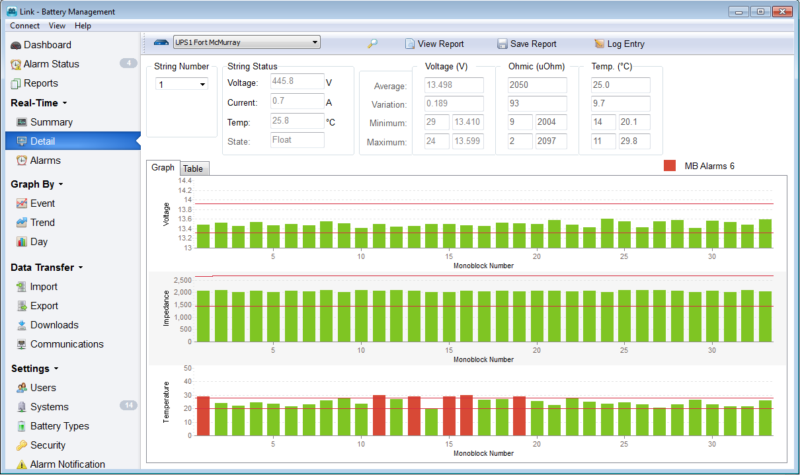Share this
Completing full battery tests during commission can save your company's reputation
by PowerShield on Jun 2, 2017 8:40:58 AM
When battery tests are not battery tests
In this digital age the performance of data centres is increasingly critical to an organisation’s reputation, in almost every industry sector. That puts immense pressure on data centres to perform, and makes the impact of failures more acute.
Procedures like a discharge test (also known as a load test or capacity test, which accurately measures the true capacity of a battery system and in turn determines the health of batteries) can make all the difference between happy customers and reputational disaster.
In a recent Emerson study, they found that the average cost (to the data centre operator) of a data centre failure is $500,000 (USD). This includes lost revenue, damages and repair costs.
It also considers the loss in reputation. Data centres live and die off their reputations, particularly in North American markets. If your data centre suffers a failure, you can lose the faith of your current and potential customers, risking thousands of dollars in lost revenue (real and potential). As American writer Benjamin Franklin once advised, “Glass, china, and reputation, are easily cracked, and never well mended.” Batteries are at the heart of this reputational risk, as 60% of the time when a failure occurs at a data centre, the cause is a battery. The discharge test as part of the commissioning tests for batteries is one key check that often gets overlooked because it is time consuming and expensive.
In a typical data centre, an uninterruptible power supply (UPS) is specified to provide backup power for a period of 5 – 15 minutes. A UPS commissioning test that performs a partial discharge test will verify the UPS, however what this fails to do is properly assess the total battery health. Only monitored full discharge battery tests will ensure all potential faults are picked up.
What are the benefit of completing a full discharge test at commission?
- Total battery health assessment
Monitoring the state of your batteries throughout their life will provide you with the information you need to keep your systems going, identifying faults. However, there is still some information that monitoring a battery under charge alone can’t provide.
A full discharge test allows for the detection of poor connections, string imbalances, low capacity batteries, damaged batteries, or an installed battery that hasn’t been conditioned properly.
During a commissioning process, everyone is still present. This means that if a fault is identified, more often than not an agreement on a course of action between everyone present can happen immediately.
- Proactive battery management
By identifying the problem batteries and any faults that might exist early, you avoid keeping faulty batteries in your string that may cause several problems down the track. A battery that has a problem, can be replaced at the start, not during its life.
For example, batteries that do not charge at the desired voltage cause an imbalance in the string which in turn will place stress on the good batteries, impacting on their life.
Because the batteries are connected in series, the individual charge characteristics influence one another, and the ageing of a battery is dependent on its physical and electrical environment. As the battery string ages, there is a point in time where it is no longer effective to replace old batteries with new batteries therefore the entire battery string has to be replaced before the expected service life has been reached.
However, if battery faults are identified early, then the chances of having to replace the entire string before end of service life are significantly reduced, avoiding early replacement.
- Longer life
After fixing all the found problems, starting with a healthy and balanced battery is critical to obtaining the full service life and ensuring the UPS is going to perform when called upon. It gives you much greater assurance that the risk of failures is reduced and you will get the full life out of your batteries, rather than having to replace them early.
Continuous monitoring is vital to ensure any sign of problem is detected early and quickly, but identifying the problems before the UPS is in use means that you can be assured your monitoring is much more accurate.
With such high stakes for data centres, it becomes important to ensure the quality of your batteries. Completing discharge battery tests, and completing it early, can help to guarantee that your batteries have a lower chance of failure and you are set up with more accurate monitoring throughout the rest of their life. All of this helps to ensure your data centre’s reputation doesn’t suffer any cracks.
PowerShield provide battery monitoring solutions to data centres across the world. To find out more about our new product visit the website here.
Share this
You May Also Like
These Related Stories

Does investing in a battery management system stack-up?

Three benefits of battery monitoring visibility for data centers

The naked truth on data center outages
- September 2024 (1)
- December 2021 (2)
- March 2020 (1)
- January 2020 (1)
- December 2019 (1)
- October 2019 (2)
- July 2019 (1)
- May 2019 (2)
- April 2019 (1)
- March 2019 (2)
- January 2019 (1)
- December 2018 (1)
- November 2018 (1)
- August 2018 (3)
- July 2018 (1)
- June 2018 (2)
- May 2018 (2)
- March 2018 (2)
- February 2018 (2)
- January 2018 (1)
- November 2017 (1)
- October 2017 (1)
- August 2017 (3)
- June 2017 (1)
- March 2017 (1)
- November 2016 (1)
- October 2016 (1)
- September 2016 (2)